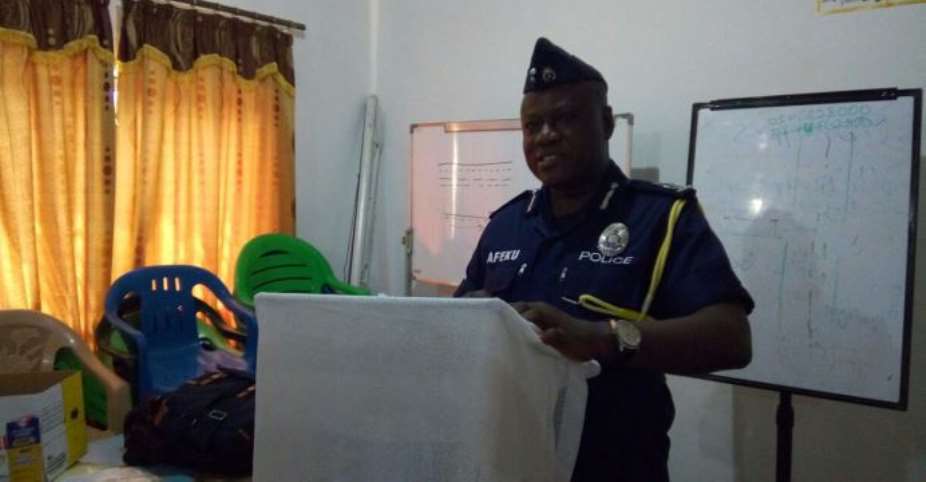The Upper East Regional Police Commander, DCOP Vincent Redeemer Dedjo, has reportedly descended on journalists for asking him whether his outfit had made any arrests in connection with the recent Bolgatanga chieftaincy dispute, which resulted in the death of two persons.
“I don't do my policing in the media. I have put all the necessary security measures in place, and that is what is important to me,” DCOP Dedjo is quoted as saying by our Upper East Regional Correspondent.
When the reporter asked him: “Sir, do you mean you will not confirm or otherwise, any arrests?” the police boss retorted: “I said policing is not about talking in the media, but about doing the right thing, and I have done so.”
The Chronicle is shocked about the conduct of DCOP Dedjo, which has exposed him for the disdain that he has for the media. Almost on a daily basis, his colleagues in the regions call news conferences to brief the media about the strategy they have put in place to fight against crime in the country. When criminals, especially armed robbers, are arrested, the same media men and women are invited for briefing on how the suspects were arrested.
The Chronicle is sure DCOP Dedjo, as a senior police officer, has once addressed a press conference to brief the media about the work his outfit is doing. The Chronicle is equally aware that both the National and Regional Headquarters of the police administration have Public Affairs Departments, which it uses to communicate with the public through the media.
The big questions are: If the police do not do their work through the media, on what basis did the IGP and his administrators establish the Public Affairs Departments? Why should the media be invited to cover the arrest of armed robbers? Are the police not doing policing work in the media if DCOP Dedjo's comment should be taken serious?
It is instructive to note that this is not the first time a senior police officer is putting up this strange behaviour. About three years or so ago, another Upper East Regional Commander, DCOP Afeku, put up similar behaviour, and it took the intervention of the then IGP, Mohamed Alhassan, to resolve the impasse.
Mr Alhassan, after reading in The Chronicle that his subordinate had snubbed journalists, called our Editor and followed up with another call to the regional correspondent in Bolga to apologise on his Regional Commander's behalf. He also instructed DCOP Afeku to call the journalists involved in the snub to his (Afeku's) office and apologise to them, which he (Afeku) did.
The conduct of Mr Alhassan tells the importance the police, as an institution, attaches to the work of journalists. It, however, appears that some of the senior officers do not value the work of the media. Such officers would always create a bad image for the whole Police Service.
The Chronicle is, therefore, calling on the current IGP, David Asante Appeatu, to rein in his senior commanders, because if the media also decides to boycott activities of the police, it is rather the latter that would suffer.
If DCOP Dedjo felt the media personnel were irritating him, he could have referred them to his PRO, instead of spewing out that unfortunate comment.
Dedjo is being paid by the tax payer; he is not working in his private firm, where he can decide what he should do. The media is the Fourth Estate of the Realm and has the constitutional duties to educate, entertain and inform the public.
The information the journalists were seeking from DCOP Dedjo was not meant for their personal consumption, but for the public. The police certainly need the media, and nothing must be done to mar the good working relationship that has been cultivated over the years.





 Minority will expose the beneficial owners of SML, recover funds paid to company...
Minority will expose the beneficial owners of SML, recover funds paid to company...
 Prof. Opoku-Agyemang has ‘decapitated’ the NPP’s strategies; don’t take them ser...
Prof. Opoku-Agyemang has ‘decapitated’ the NPP’s strategies; don’t take them ser...
 Abubakar Tahiru: Ghanaian environmental activist sets world record by hugging 1,...
Abubakar Tahiru: Ghanaian environmental activist sets world record by hugging 1,...
 Prof. Naana Opoku-Agyemang will serve you with dignity, courage, and integrity a...
Prof. Naana Opoku-Agyemang will serve you with dignity, courage, and integrity a...
 Rectify salary anomalies to reduce tension and possible strike action in public ...
Rectify salary anomalies to reduce tension and possible strike action in public ...
 Stop all projects and fix ‘dumsor’ — Professor Charles Marfo to Akufo-Addo
Stop all projects and fix ‘dumsor’ — Professor Charles Marfo to Akufo-Addo
 Blue and white painted schools will attract dirt shortly – Kofi Asare
Blue and white painted schools will attract dirt shortly – Kofi Asare
 I endorse cost-sharing for free SHS, we should prioritise to know who can pay - ...
I endorse cost-sharing for free SHS, we should prioritise to know who can pay - ...
 See the four arsonists who petrol-bombed Labone-based CMG
See the four arsonists who petrol-bombed Labone-based CMG
 Mahama coming back because Akufo-Addo has failed, he hasn't performed more than ...
Mahama coming back because Akufo-Addo has failed, he hasn't performed more than ...
